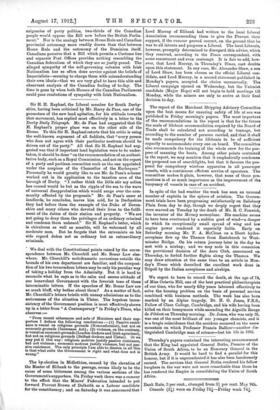We deal with the Constitutional points raised by the corre-
spondence between Mr. Churchill and Mr. Boner Law else- where. Mr. Churchill's melodramatic excursions outside the bounds of his own department are familiar, and the composi- tion of his two tremendous letters may be only his peculiar way of taking a holiday from the Admiralty. But it is bard to reconcile what he says as to the calm and serene attitude of our benevolent Government with the feverish tone of these interminable letters. If the speeches of Mr. Bonar Law are so much bluff, why bother about them? As a matter of fact, Mr. Churchill's letters bristle with uneasy admissions as to the seriousness of the situation in Ulster. The hopeless incon- sistency of the Government position is most effectively shown up in a letter from "A Contemporary" in Friday's Times, who observes :- "Prom recent utterances and acts of Ministers and their sup- porters I deduce the following conclusions :—(1) Passive resist- ance is venial on religions grounds (Nonconformist), but not on economic grounds (Insurance Act) ; (2) violence, on the contrary, is venial on economic grounds (London dockers and Irish agrarians), but not on religious grounds (Belfast dockers and Ulster). Or we may put it this way : religious motives justify passive resistance, but not violence ; economic motives justify violence, but not pas- sive resistance. The only principle I am able to discern in all this is that what suits the Government is right and what does not is wrong."






































 Previous page
Previous page